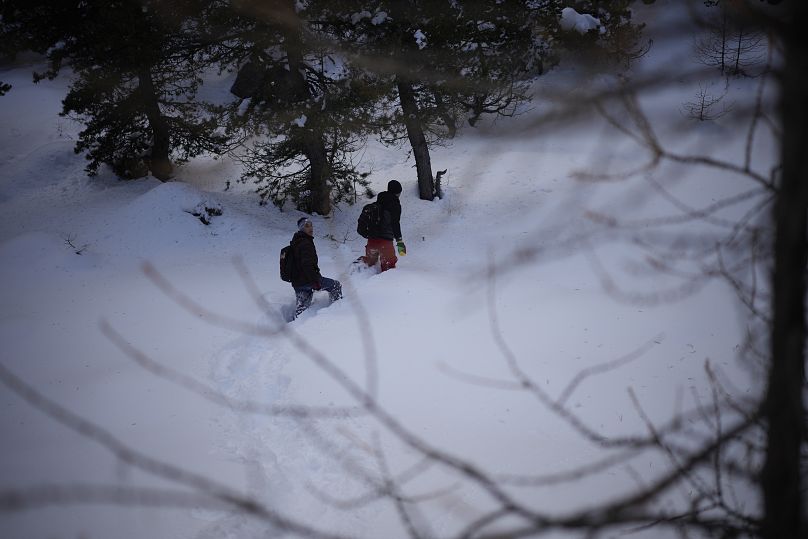"Why are we doing this? Because sailors never leave a person to die at sea, same as a mountaineer will never leave a person to die in the mountains," revealed Paquerette Forest, a retired teacher who volunteered to help migrants.
The Carthaginian general Hannibal famously used the route for a surprise attack on the Roman legions, but now migrants are risking their lives clandestinely crossing the Alps from Italy to France.
With fewer border checks, the route attracts those looking to evade the authorities and move freely, helped by some volunteers.
As the winter season arrives, the mountain pass offers its own challenges. Humanitarian workers distribute hand-warmers to the shivering migrants and help them hide in snowy woods until the coast is clear.
"We were frozen, we couldn't feel our fingers, we couldn't feel anything, it was very cold. We even thought that we would like the police to come and take us to the station, so we wouldn't be so cold," said 23-year-old Aymen Jarnane, a Moroccan led to safety on a night when the thermometer dropped to minus-15 degrees Celsius.
Some volunteers have taken it upon themselves to help the migrants survive the dangerous peaks.
They are driven by a simple creed: the exiles from conflict zones and oppression of all kinds who trek through the Alps in search of brighter futures in European towns and cities are people, first and foremost.
"Why are we doing this? Because sailors never leave a person to die at sea, same as a mountaineer will never leave a person to die in the mountains," revealed Paquerette Forest, a retired teacher who volunteered to help migrants.
"Now there are people who are trying to cross who are in difficulties and often they are vulnerable, and they don't know the mountains and they put themselves in danger without knowing. So, people that know this area go to the mountains to meet them and help them," she went on.
Armed with thermoses of hot tea and the belief that their own humanity would be diminished if they left pregnant women, children, and men young and old to fend for themselves, the Alpine helpers are a counter-argument to populist politicians who say that migrants are threatening European livelihoods and liberal traditions.
In the mountains, on both sides of the border, the approach is essentially humanist and humanitarian, grounded in local traditions of not leaving people alone against the elements.
"People arrive cold, dehydrated, thirsty, hungry"
Starting around 2016, when they first began encountering sneakered and thinly clothed migrants in trouble on Alpine passes, mountain workers refused to look the other way.
That assistance seeded what has since become networks of hundreds of volunteers who run migrant shelters, clothe them for the hazardous crossing, and trek into the cold.
They bash paths in the snow by day for migrants to follow and wait for them at night, to guide them past border police to safety and, if necessary, treatment for frostbitten extremities and other medical needs.
Unlike the Mediterranean crossing where hundreds have died or gone missing this year alone, the Alps are not as deadly for migrants thanks to the volunteers providing migrants with life-saving shelters.
The mountains have so far been spared from tragedies such as November's boat sinking in the English Channel, which killed 27 men, women, and children.
However, there have been a few deaths.
Several aid groups pleaded for French authorities to provide Alpine shelter to exiles and stop pushing them back into Italy after a Togolese man found hypothermic in freezing temperatures died during a night trek across the border in February 2019.
Health workers in a volunteer-run shelter for migrants on the French side, in the fortified town of Briançon, patch up those who get through.
"People arrive cold, dehydrated, thirsty, hungry," said Isabelle Lorre of Doctors of the World, after taking care of an Iranian with an infected toe who trekked for 15 hours through snow he said was hip-deep at times.
European opponents of migration argue that aiding exiles encourages others to follow, but the view of those assisting them in the Alps is that not helping simply isn't an option.












